Related Research Articles

John Wilson of Elleray FRSE was a Scottish advocate, literary critic and author, the writer most frequently identified with the pseudonym Christopher North of Blackwood's Edinburgh Magazine.

William Blackwood was a Scottish publisher who founded the firm of William Blackwood and Sons.
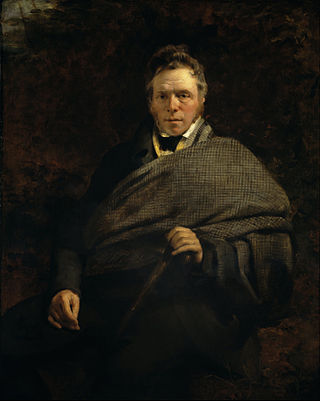
James Hogg was a Scottish poet, novelist and essayist who wrote in both Scots and English. As a young man he worked as a shepherd and farmhand, and was largely self-educated through reading. He was a friend of many of the great writers of his day, including Sir Walter Scott, of whom he later wrote an unauthorised biography. He became widely known as the "Ettrick Shepherd", a nickname under which some of his works were published, and the character name he was given in the widely read series Noctes Ambrosianae, published in Blackwood's Magazine. He is best known today for his novel The Private Memoirs and Confessions of a Justified Sinner. His other works include the long poem The Queen's Wake (1813), his collection of songs Jacobite Relics (1819), and his two novels The Three Perils of Man (1822), and The Three Perils of Woman (1823).
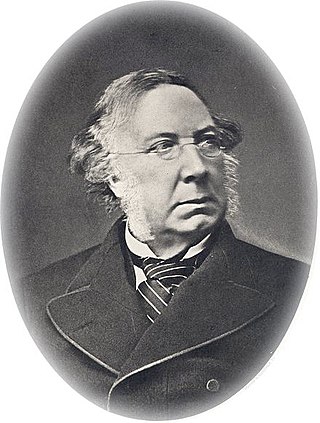
Henry Glassford Bell was a Scottish lawyer, poet and historian.
Thomas Hamilton was a Scottish soldier and author.

The Private Memoirs and Confessions of a Justified Sinner: Written by Himself: With a detail of curious traditionary facts and other evidence by the editor is a novel by the Scottish author James Hogg, published anonymously in 1824.

St Mary's Loch is the largest natural loch in the Scottish Borders, and is situated on the south side of the A708 road between Selkirk and Moffat, about 72 kilometres (45 mi) south of Edinburgh.
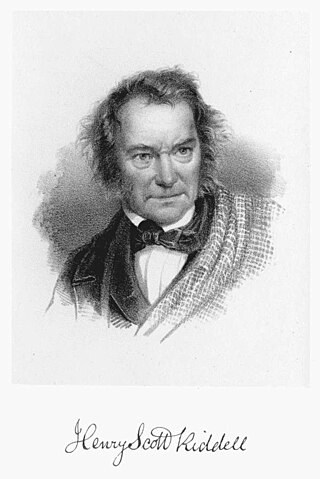
Henry Scott Riddell was a Scottish poet and songwriter. In the Scottish Orpheus, a collection of songs of Scotland by Adam Hamilton, he is credited with writing Scotland Yet and The Dowie Dens O' Yarrow.
The Edinburgh Advertiser, sometimes referred to as The Advertiser, was a twice-weekly newspaper published in Edinburgh, Scotland, on Tuesday and Friday mornings for almost a century, from 1764 to 1859.

Sir John Skelton was a Scottish lawyer, author and administrator. He is best known for his contributions to The Guardian and Blackwood's Magazine.
Events from the year 1822 in Scotland.

William Blackwood and Sons was a Scottish publishing house and printer founded by William Blackwood in 1804. It played a key role in literary history, publishing many important authors, for example John Buchan, George Tomkyns Chesney, Joseph Conrad, George Eliot, E. M. Forster, John Galt, John Neal, Thomas De Quincey, Charles Reade, Margaret Oliphant, John Hanning Speke and Anthony Trollope, both in books and in the monthly Blackwood’s Magazine.

William Nicholson was a British painter of portraits and other subjects. He was among the founding members of the Scottish Academy of Painting, Sculpture, and Architecture in 1826, and was its first secretary.
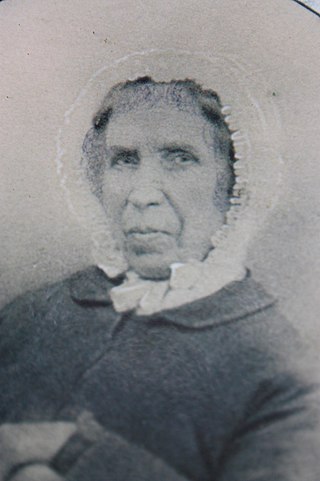
Tibbie Shiel (1783–1878) was a Scottish figure who ran Tibbie Shiel's Inn on St Mary's Loch in the Scottish Borders and was known to many authors and poets, and the subject of numerous literary works.
Songs, By the Ettrick Shepherd is a collection of 113 songs by James Hogg published in 1831. All except one of the songs had previously appeared in print, mostly either in Hogg's earlier publications or in a range of periodicals.
A Queer Book (1832) is a collections of 26 poems, mostly short narratives, by James Hogg, all but two of which had been previously published, more than half of them in Blackwood's Edinburgh Magazine.
Altrive Tales (1832) by James Hogg is the only volume to have been published of a projected twelve-volume set with that title bringing together his collected prose fiction. It consists of an updated autobiographical memoir, a new novella, and two reprinted short stories.
The Shepherd's Calendar (1829) is a collection by James Hogg of 21 articles, most of which had appeared in Blackwood's Edinburgh Magazine since 1819. They are set in, or deal with aspects of, the Scottish Borders, in particular Hogg's native Ettrick Forest.
The Brownie of Bodsbeck (1818) is the first (short) novel by James Hogg. Set in the Scottish Borders in 1685 it presents a sympathetic picture of the persecuted Covenanters and a harsh view of the Royalists led by Clavers (Claverhouse). It draws extensively on local superstitions.
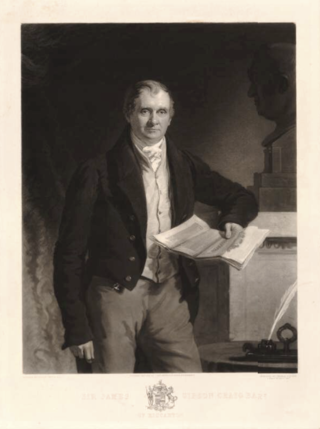
Sir James Gibson-Craig, 1st Baronet (1765–1850) was a Scottish lawyer and government official. In politics he was a Foxite Whig. In early life he was known as James Gibson of Ingleston. He was created a baronet in the Baronetage of the United Kingdom in 1831.
References
- Wilson, John (1855) Noctes Ambrosianae, edited by J. F. Ferrier. Edinburgh: William Blackwood & Sons.